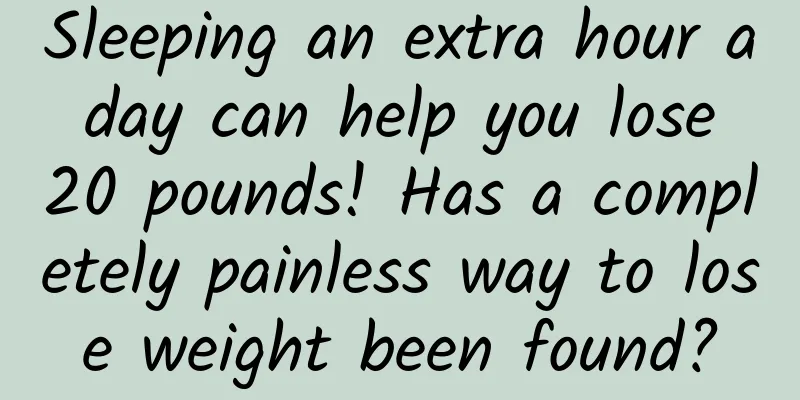Sleeping an extra hour a day can help you lose 20 pounds! Has a completely painless way to lose weight been found?

|
Reviewer of this article: Chen Haixu, Deputy Director and Master Supervisor of the Second Medical Center of PLA General Hospital Lack of sleep affects our appetite, making us eat more. A 2019 meta-analysis pointed out that for every hour less sleep, the risk of obesity increases by 9%. Since lack of sleep can cause weight gain, can we lose weight by extending sleep time? In a randomized clinical trial of 80 adults published in JAMA Internal Medicine on February 7, Esra Tasali, MD, director of the UChicago Sleep Center at the University of Chicago Medicine, and her colleagues found that overweight people who habitually slept less than 6.5 hours a night could reduce their total daily calorie intake by 270 kcal after extending their sleep time by 1.2 hours through personalized sleep counseling. The researchers said that based on this trend, a person could lose 12 kilograms in three years just by sleeping a little longer. This new study not only studied the effects of extended sleep time on caloric intake, but also importantly, all operations were conducted in a real environment, and the participants' eating habits were not manipulated or controlled in any way. The subjects slept in their own beds, and the researchers tracked their sleep with wearable devices. Apart from that, their lives were normal, without any intervention of diet or exercise guidance. The mainstream view is that the main cause of the obesity epidemic in modern society is the increase in calorie intake, not the lack of exercise. In order to objectively track the participants' calorie intake, the researchers used the "doubly labeled water" method to observe changes in energy storage. In the water molecules of doubly labeled water, the hydrogen and oxygen elements are replaced by their isotopes deuterium and oxygen-18. Deuterium and oxygen-18 are naturally occurring stable isotopes and are not radioactive. When the subjects drink this doubly labeled water, the labeled isotopes will participate in the body's metabolic processes and be excreted through urine, sweat and exhaled carbon dioxide. By tracking the changes in isotope peaks in urine, researchers can calculate the body's energy metabolism. The senior author of the study, Dr. Dale A. Schoeller, professor emeritus of nutritional sciences at the University of Wisconsin–Madison, believes that "this is the gold standard for objectively measuring daily energy expenditure in a non-laboratory real-world environment. It has changed the way human obesity is studied." The study lasted for 4 weeks, with the first 2 weeks used to collect baseline information on sleep and calorie intake, and the last 2 weeks used to monitor the effects of the sleep intervention. In Tasali's opinion, the most surprising aspect of the study was the simplicity of the intervention. "Most other laboratory studies on this topic have been short-term settings lasting only a few days, and food intake is calculated by how much the subjects consumed from a provided diet," she said. "In our study, we only controlled for sleep, and participants ate whatever they wanted, and they did not need any food logs or other means to track their nutritional intake." In addition, participants were able to change their bedtime habits and sleep longer with just one sleep consultation. Tasali added that the researchers provided sleep health training to each participant and discussed their own personal sleep environment, providing tailored suggestions on changes they could make in the hope of increasing their daily sleep duration to 8.5 hours. In addition, participants did not know that they were receiving a sleep intervention, and the recruitment materials did not mention it, so the researchers were able to capture people's true habitual sleep patterns during the baseline test. After just one consultation, participants slept an average of more than an hour more per night (the study found that limiting the use of electronic devices before bed is key to extending sleep). Although the researchers did not require the participants to change other lifestyles, most of them ate significantly less, an average of 270 kcal per day, which is equivalent to eating one less cheeseburger, and some participants even reduced their daily energy intake by 500 kcal. In fact, a 2011 study discussed the relationship between sleep and appetite. Marie Pierre St-Onge, associate professor of nutritional medicine at Columbia University, and her colleagues found that people who slept only four hours a night would eat more the next day, with an extra calorie intake of about 300 kcal. This coincides with the new research results of Tasali's team. In addition, sleep deprivation increases the production of ghrelin, while insufficient sleep reduces the level of leptin in the body, which can lead to increased food intake and weight gain. Worse still, insufficient sleep can make people want to eat more high-salt, high-sugar and high-fat foods, which stimulate the reward system in the brain and put the body into a vicious cycle of eating more and more. "This was not originally a weight loss study," Tasali said, "but even in just two weeks, we have quantitative evidence showing reduced calorie intake and negative energy balance (calorie intake is less than expended). If healthy sleep habits are maintained over the long term, this will lead to clinically important weight loss over time. Many people work very hard to find ways to lose weight by reducing calorie intake - so, just sleep more." However, the authors of this study also stated in the paper that since the study was conducted in overweight people and excluded those with sleep apnea or who needed to work at night, the observation period for calorie intake after extended sleep was only two weeks, so the result of "sleeping more can eat less" has certain limitations. Ultimately, Tasali and her team hope to validate potential mechanisms that may explain these results and believe this work should inspire new, larger studies of weight management to determine whether extended sleep can support weight loss and help prevent or reverse obesity. "In our earlier work, we knew that sleep is important for appetite regulation," Tasali said. "Now we've shown that in real life, you can increase your sleep duration and reduce your calorie intake without making any other lifestyle changes. This could really help people who need to lose weight." Source: Research Circle (ID: keyanquan), UNIVERSITY OF CHICAGO MEDICAL CENTER Compiled by: Li Xiaoxing Original link: https://www.eurekalert.org/news-releases/942359 The pictures in this article with the "Science Popularization China" watermark are all from the copyright gallery. The pictures are not authorized for reprinting. |
>>: How much do you know about the history of human use of energy?
Recommend
How did the most silent organ in the body turn into a killer?
【Written at the end】 In 2020, more than 410,000 p...
New Android vulnerability exposed: secretly taking photos and uploading
Following the multiple vulnerabilities in iOS7.1.1...
21 ways to help you acquire effective users at low cost!
From the perspective of product operation , how t...
One chart to understand丨The world’s population has reached “8 billion”, how long will it take to reach the next “1 billion”?
The world population reached 8 billion on Novembe...
I never thought that WeChat's collection notes have 6 practical functions hidden in them. Learning them is a great way to gain knowledge.
[[399988]] First open WeChat and click "Me&q...
What are the functions of the designated driver mini program? How much does it cost to make a designated driver app?
Nowadays, the country’s control over drunk drivin...
Breaking news! Apple Store made major adjustments and many apps were cleared of keywords. What is the reason behind this?
Breaking news! The Apple Store has undergone majo...
IDC: AI-driven smartphone spending will reach $32 billion in 2028
IDC's 2025 Asia Pacific (excluding Japan) cus...
Where is the world's longest existing ancient city wall? Not in Beijing, nor in Xi'an...
The basic exhibition hall of Nanjing City Wall Mu...
Mobile phones are no longer integrated and the batteries have to be disassembled again? Isn’t this a joke!
01 Do users think the waterproof function is usel...
Why is the CPU frequency of Xiaomi 5, which costs 1999 yuan, so low?
The three versions of Xiaomi 5 all have the same ...
Our world is so beautiful, how are these colors made?
Light brings brightness to the world. Humans and ...
We both purchased billions of advertising exposures, but yours has no effect?
A few days ago, I saw a message from the head of ...
Huawei Maimang 4 review: 96% positive reviews on JD.com
Huawei has the highest market share in China, and...
Cherish life and beware of “dry drowning”!
Author: Sun Yuhang and Zhou Yixi Medical College ...









